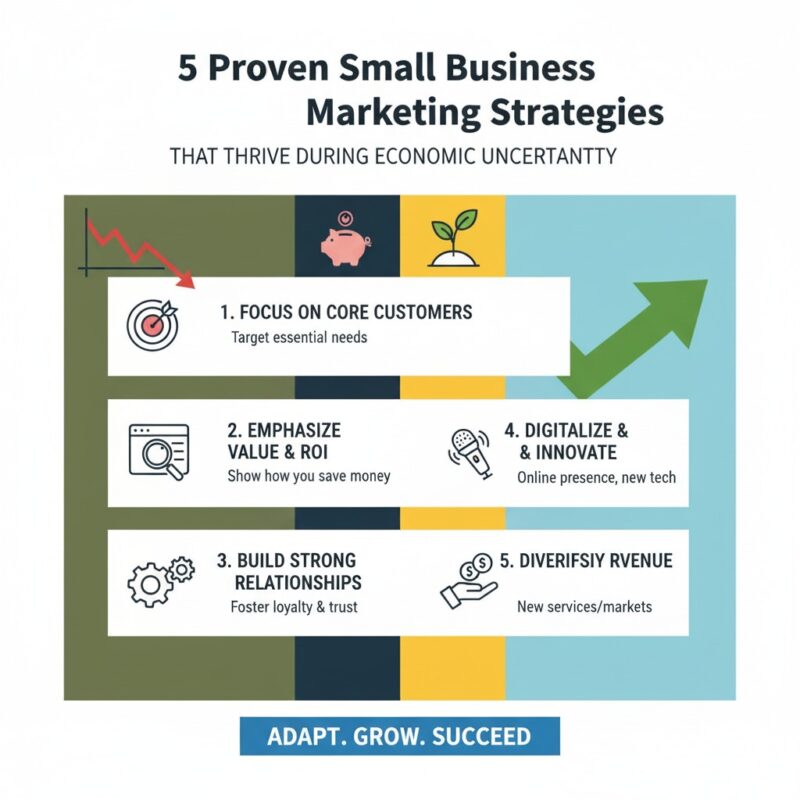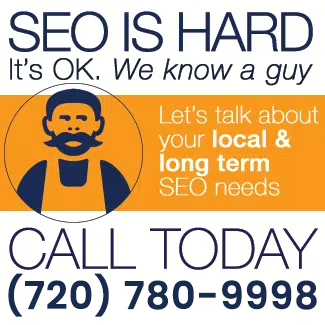When economic storms hit, smart businesses don’t just survive—they dominate. While 30% of consumers feel pessimistic about a potential recession, the companies that know how to navigate uncertainty often emerge stronger than ever. Here’s how your small business can not only weather economic turbulence but actually gain market share while your competitors retreat.
Why Economic Uncertainty Creates Marketing Opportunities
Economic downturns might seem scary, but they’re actually goldmines for prepared businesses. Research shows that companies maintaining marketing spend during recessions capture future growth, while those cutting back can lose millions in long-term revenue. The key? Understanding that while consumer behavior shifts, it doesn’t disappear—it just changes direction.
What’s the one marketing change you’re most hesitant to make during uncertain times, and what’s really holding you back from testing it on a small scale first? Contact us today about creating a website for your small business
Here’s what’s happening right now: 81% of consumers now research across multiple channels before purchasing, and they’re actively seeking value while still willing to spend on what matters to them. This creates a massive opportunity for businesses that can adapt their messaging and positioning.
Strategy 1: Turn Ad Scarcity Into Your Competitive Advantage
Don’t slash your advertising—demand efficiency instead.
When competitors pull back on marketing spend, smart businesses double down. The classic example? During the Great Depression, Kellogg continued advertising while Post dramatically reduced their spend. The result? Kellogg emerged as the dominant market leader while Post never recovered their position.
Why this works now: When businesses cut advertising, media costs drop significantly. This means you can:
- Secure premium ad placements at lower costs
- Capture increased market share from retreating competitors
- Build brand awareness while competitors go silent
Action step: Instead of cutting your marketing budget, audit your current spend for efficiency. Focus on channels with the highest ROI and negotiate better rates with media partners who are hungry for business.
Strategy 2: Double Down on Customer Loyalty When Trust Matters Most
In uncertain times, consumers cling to brands they trust.
Look at airline loyalty programs—they’re not just about flying. American Airlines often loses money on flights but generates profit margins of 52% selling frequent flyer miles. Why? Because people desperately want to belong to something reliable during uncertain times.
Your loyalty program should:
- Offer genuine value that goes beyond discounts
- Create a sense of exclusive belonging
- Provide emotional reassurance through consistent positive experiences
- Use tiered benefits that encourage increased engagement
Quick win: If you don’t have a formal loyalty program, start simple. Create a VIP email list with exclusive early access to sales, special content, or personalized recommendations. Make your best customers feel seen and valued.
Strategy 3: Align Your Brand With Causes That Matter to Your Customers
Purpose-driven marketing isn’t just feel-good—it’s profitable.
Consumers facing economic stress want to feel good about their purchases. They’re drawn to brands that stand for something beyond profit. Take Good Laundry—they differentiated in the crowded eco-friendly detergent market by partnering with animal welfare and conservation charities.
The psychology behind this strategy: When money feels tight, people want their spending to have meaning. Research shows consumers are willing to pay more for products from companies that align with their values.
Implementation tips:
- Choose causes that genuinely connect to your business mission
- Be authentic—consumers can spot performative activism instantly
- Share specific outcomes and impact, not just intentions
- Integrate cause messaging into your regular communications
Strategy 4: Use Cause-Driven Messaging to Flatten Your Sales Cycle
Strategic partnerships accelerate sales during slow periods.
Beyond the emotional benefits, cause-driven marketing serves as a legitimate reason to reach prospects during typically slow sales periods. It bypasses spam filters and gives you permission to start conversations when traditional sales approaches feel pushy.
The business impact:
- Provides hedge against race-to-bottom pricing
- Creates differentiation in commoditized markets
- Generates word-of-mouth marketing through shared values
- Opens doors during traditional down cycles (February-April, August-October)
Pro tip: Time your cause-driven campaigns strategically. Launch during slower business periods when your competitors are quiet, and you’ll capture more attention and mindshare.
Strategy 5: Position Your Business as Essential to Health and Financial Wellness
“Health is wealth” messaging resonates powerfully during economic stress.
Smart businesses connect their products or services to staying healthy, saving money, or avoiding future costly problems. This strategy works because it reframes your offering from a “nice-to-have” to a “need-to-have.”
Effective positioning examples:
- Service businesses: “Investing in professional maintenance now prevents costly emergency repairs later”
- Health/wellness: “Staying healthy is the best insurance against medical bills”
- Education/training: “Upgrading your skills is recession-proof career protection”
- Quality products: “Buy once, use for years—the math favors quality”
The Current Economic Reality: What Small Businesses Need to Know
According to recent 2024 research, 77% of small business owners expect to survive in today’s economy, but survival isn’t enough. The businesses that thrive understand that AI and machine learning, social commerce, and ethical marketing are the biggest trends driving small business success in 2024.
Consumer behavior insights:
- Net consumer sentiment dropped 32% due to economic uncertainty
- 80% of consumers are actively trading down and seeking value
- 72% of companies use social media for business intelligence
Ready to Turn Economic Uncertainty Into Your Competitive Advantage?
The businesses that emerge stronger from economic uncertainty share one trait: they act decisively while others hesitate. They understand that downturns don’t just threaten—they also reveal opportunities for bold companies willing to adapt their approach.
Your next steps:
- Audit your current marketing spend for efficiency opportunities
- Strengthen relationships with existing customers through value-added services
- Research causes that authentically align with your business values
- Reframe your messaging to emphasize value, health, and financial wisdom
Remember: companies that maintain or increase marketing spend during economic downturns consistently outperform those that cut back. The question isn’t whether to invest in marketing during uncertainty—it’s how to invest smarter.
Looking for help implementing these strategies? Our team specializes in helping small businesses optimize their marketing for maximum impact, even in uncertain times. Start with a free, no-pressure consultation to discover how we can strengthen your digital presence and drive more qualified leads.
For more insights on building a recession-proof business foundation, explore our comprehensive FAQ about small business website best practices.


